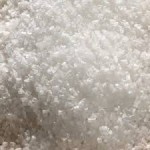Is Salt Really All That Bad?
 Why do we keep trying to reduce our salt intake? Medical literature has linked reduced salt intake to insulin resistance (diabetes), metabolic syndrome, increased cardiovascular mortality and readmissions, cognition loss in neonates and older adults, unsteadiness, falls, fractures, and lifelong avidity for salt. But high salt intake is linked to hypertension you say! Consider this – the standard hospital saline IV drip, which supplies an average of three liters of 0.9 percent sodium chloride per day. This is equivalent to twenty-seven grams of salt (4.5 teaspoons) per day while in the hospital in addition to the six grams (one teaspoon) of salt taken in food (if the Guidelines are followed). That is a total of thirty-three grams of salt per day or more than five times the Dietary Guideline recommendations! Yet patients’ blood pressure is checked every four to six hours and does not change. Where is the purported relationship of salt intake to blood pressure?
Why do we keep trying to reduce our salt intake? Medical literature has linked reduced salt intake to insulin resistance (diabetes), metabolic syndrome, increased cardiovascular mortality and readmissions, cognition loss in neonates and older adults, unsteadiness, falls, fractures, and lifelong avidity for salt. But high salt intake is linked to hypertension you say! Consider this – the standard hospital saline IV drip, which supplies an average of three liters of 0.9 percent sodium chloride per day. This is equivalent to twenty-seven grams of salt (4.5 teaspoons) per day while in the hospital in addition to the six grams (one teaspoon) of salt taken in food (if the Guidelines are followed). That is a total of thirty-three grams of salt per day or more than five times the Dietary Guideline recommendations! Yet patients’ blood pressure is checked every four to six hours and does not change. Where is the purported relationship of salt intake to blood pressure?
But don’t read this wrong. W’e’re not advocating hitting all the high sodium, processed food items! Don’t empty your salt shaker on your next dinner! Refined processed table salt should still be avoided! What needs to be ADDED to your diet is COARSE, UNREFINED, SEA SALT. Toss the shaker and get a salt grinder! Sea salt is loaded with trace minerals along with the salt. Sea salt can boost your immune system. Sea salt can help REDUCE cholesterol levels, maintain proper sugar levels in the body, prevent osteoporosis, stop muscle spasms and cramps, and even aid in proper digestion!
So, please, rethink your salt consumption. Add some flavor and enjoy your food again! It’s good for you!

